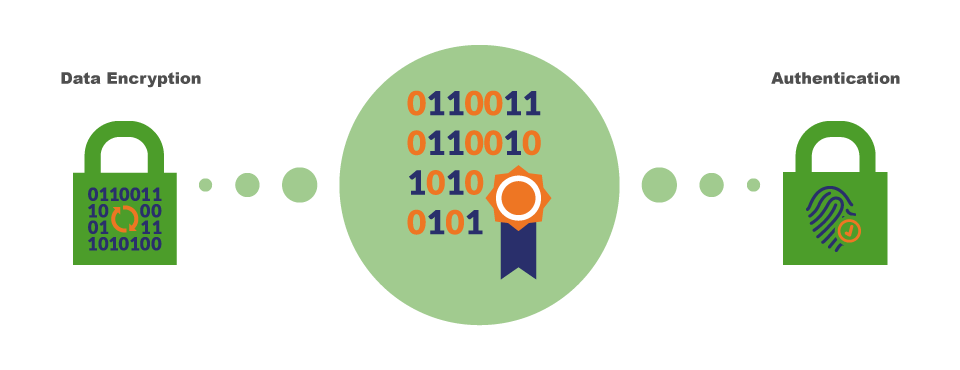What is an SSL Certificate?
SSL Certificates are special data files on a web server that enables secure encrypted online communications. When installed, it enables a secure connection between a browser and a web server thru the HTTPS protocol, it also activates the green padlock on the browser. SSL, which stands for Secure Sockets Layer, is the standard security protocol that establishes an encrypted link between browser and a web server.
Using SSL ensures that all data exchanged between the browsers and web server remains private and encrypted. This is done thru cryptographic methods that uses two keys for encryption. This is important because when you send information on the Internet, it is passed from one computer to another computer before it gets to the destination server. Without encryption, any sensitive information like usernames, passwords and credit card numbers can be seen by any computer between you and the server.
Additionally, SSL also provides authentication. This ensures that the information your website visitors are sending is going to the right server and not to someone else trying to steal personal information. Any imposter website could pretend to be yours and trick visitors into sending their personal information to them. To avoid this always get an SSL Cert from a trusted provider.

What is Data Encryption?
At the point when a website visitor and a web server communicate, normally that data is out in the open and capable of being manipulated or intercepted by an outsider. For clear reasons, this isn't secure. An SSL/TLS Certificate creates a connection thats is encrypted, where all communication between the visitor and server is encoded such that only an authorized party can read it. This secures sensitive information and personal data being shared between the two.


What is Authentication?
As we have specified, a SSL/TLS Certificate serves two purpose. Firstly to encrypt communication between a site and its visitors. The second, authentication, offers verified data about the organization or company that owns the website to its visitors. Trust is significant on the web, and authentication provides your webpage's visitors with the certainty they have to do business with you.
Cheap SSL Certs from the leading Global Certification Authorities
Would you do business with somebody you don't trust?
The most important component of any business is trust, especially for online business. If the credibility of your business & website, and the security of your customer is paramount, then you’ll need an SSL.
It only takes a few seconds for an online customer to establish trust with your company. That is why having a certificate is important, especially an EV SSL or Extended Validation SSL, which plays an important role for a successful website - EV certificates are the most recognised symbols of security and trust on the internet.
Our certificates price are so cheap because they are purchased in extremely huge quantities, we pass the deep discounts to our customers. Yes! You get the same exact certificates as if you were buying them directly from leading Certificate Authorities like – Symantec, Comodo, RapidSSL, DigiCert, Thawte, Certum and GeoTrust – at a much lower price.
Which is the Best SSL for your Website?
Domain Validated SSL
Secure Just One Website
If you simply need to secure just one website, we have an extensive range of affordably priced options. Domain Validated or DV SSL are fundamental SSL products which are typically the least expensive in cost. These quick and simple certificates can be issued in just several minutes, as the Certificate Authority (CA) just needs to confirm that the individual getting the certification owns the domain they need to cover.
View all DV SSL Buy S$15 DV SSL

Multi-Domain SSL
Secure Multiple Website
Rather than obtaining and managing multiple certificates for multiple websites, you can easily secure each one of your domains with just one Multi-Domain SSL cert (SAN/UCC). Multi-Domain certificates can cover a number of domains with only a single certificate. Different multi-domain certificates can cover a different number of total domains, therefore it varies by product. Our range of Multi-Domain SSL covers anywhere from 1-100 added domain names.
View all Multi-Domain SSL Get S$35 Multi-Domain SSLWildcard SSL
Secure One Website & All Sub-Domains
Let's say you have a number of sub-domains associated with your site. Maybe a mail server (mail.domain.com) and a store area (store.domain.com), for example. You'll love Wildcard SSL. You no longer need to purchase a certificate for each and every sub-domain, one wildcard SSL cert is enough to cover them all. Save cost and make it easier to manage.
View all Wildcard SSL Buy S$140 Wildcard SSL

Organization Validated SSL
Reliable Security with Organization Validation
Organization Validated or OV SSL offers up to 256-bit encryption to sites of registered organisation and businesses. The contrast between OV certificates and domain validated (DV) certificates is that some additional reviewing (vetting) is required to affirm that you own your domain as well as that your organisation is legitimate. Be that as it may, don't worry! As long as your business is registered, the approval procedure isn't an issue. In most cases, it just takes two or three days and you'll be good to go.
View all OV SSL Get S$65 OV SSLExtended Validation SSL
Increase Visitors' Confidence & Boost Conversions
Look at some of the websites you trust and use regularly (PayPal, DBS, Facebook)... see that green address bar with the company's name displayed in it, that's an Extended Validation SSL cert. Not only does it encrypts your website, but EV certificates have also been proven to INCREASE TRUST, reduce phishing attacks and even BOOST SALES. For any businesses where the website is an essential part of success, an EV SSL is a MUST!
View all EV SSL Buy S$200 EV SSL

Can't Decide?
Speak to Our Experts
Email - Call - Chat
24x7
Powered by WHMCompleteSolution













